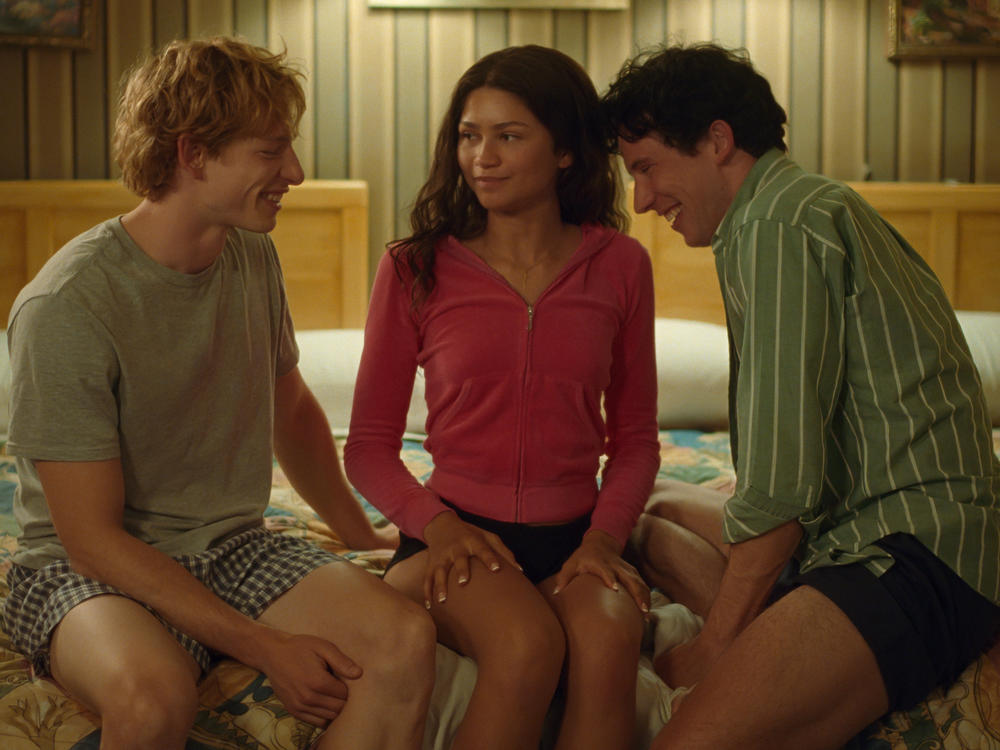Section Branding
Header Content
Watch a tense romantic triangle play out on the tennis court in 'Challengers'
Primary Content
As much as I liked his Suspiria remake and his cannibal thriller Bones and All, it's nice to see the Italian director Luca Guadagnino make a movie that doesn't end with buckets of blood. His new sports movie, Challengers, instead comes drenched in buckets of sweat, and it's the most purely entertaining thing he's made in years. It gives us a romantic triangle set in the world of tennis, and it stars three superb actors in roles that are as athletically demanding as they are emotionally rich.
It begins on a tennis court in New Rochelle, a town just north of New York City, the site of a prestigious second-tier competition known as a Challenger tournament. On one side of the net is Art Donaldson, played by Mike Faist. Art has won three of the four Grand Slam events but has now hit a bit of a slump. He's squaring off against his former best friend, Patrick Zweig, played by Josh O'Connor. Patrick hasn't had as illustrious a career as Art, but he may well be the more gifted player.
Watching them anxiously from the stands is Art's wife and coach, Tashi Duncan, played by Zendaya. It's clear that these three characters have some complicated history, which Guadagnino and the screenwriter Justin Kuritzkes proceed to unravel through a dizzying array of flashbacks.
And so we jump back 13 years to when Art and Patrick are buddies and doubles partners. Around this time they meet Tashi, a terrific tennis player who's about to begin her first year at Stanford. The boys begin a friendly competition for Tashi's affections, which the more confident Patrick initially wins. But after various ups and downs, including a twist that derails Tashi's tennis career, she winds up marrying Art and becoming his coach. Now, years later, this fateful Challenger tournament has brought the estranged Art and Patrick face-to-face once more. It's here that Patrick privately confronts Tashi and makes a startling proposition, asking her to be his coach.
Even when all the toggling between past and present gets a little repetitive, Challengers throws off an unstoppable energy. In the tennis scenes, the camera seems to be everywhere at once, and a hypnotic techno score, by Trent Reznor and Atticus Ross, pulses and surges beneath the action. And like Guadagnino's Call Me by Your Name, Challengers has a forthright sensuality that reminds you how sexually timid most mainstream American movies are by comparison.
There isn't all that much sex in the film, but there's so much erotic tension and atmosphere that it doesn't matter. Guadagnino is a master of the tease — and so, it turns out, is Tashi. In one early, flirty scene with the three of them, Tashi not only maintains the upper hand, but also reveals that these two dudes might be more attracted to each other than they let on. As the years pass, though, their youthful desire for Tashi gives way to a deeper need.
As Art, Faist shows as much live-wire physicality here as he did in the West Side Story remake, though his performance becomes more melancholy over time as Art faces his limitations. O'Connor, by contrast, is all swagger as Patrick, forever leading with his devilishly charming smile. And then there's Zendaya, who's so brilliant in her early tennis scenes that I wish Tashi hadn't been sidelined and forced into playing the role of mentor and muse to two men. But as in the recent Dune: Part Two, Zendaya keeps you watching with her mix of fierce intelligence and emotional uncertainty — over who will win the match, and what it might mean for her future.
Will Tashi stick with Art, the safe, skillful player who may not have the gumption to be one of the all-time greats? Or will she return to Patrick, the superior but more volatile talent? The movie resolves this quandary in a grand finale that's at once thrilling and maddening in the way it pushes this triangle and this tennis match to the breaking point. But by then, you can't blame Guadagnino for loving his characters so passionately, or feeling so reluctant to let them go. If it were up to him, the game would never end.
Bottom Content




